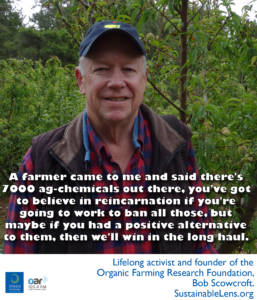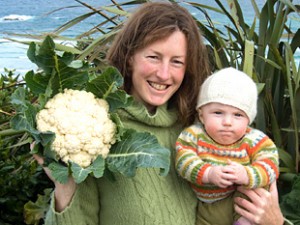A farmer came to me and said there’s 7000 ag-chemicals out there, you’ve got to believe in reincarnation if you’re going to work to ban all those, but maybe if you had a positive alternative to them, then we’ll win in the long haul.
Bob Scowcroft, the co-founder and former executive director of the Organic Farming Research Foundation talks about what lead him to a life and career of activism. What does lying down in stop signs have to do with crop regulations, and what are the challenges facing today’s passionate young activists? A master storyteller, Bob held us transfixed as we recorded this interview in the Alan Chapman Garden at the University California Santa Cruz.
Talking Points
It was the times…someone I barely knew dropped out of school, went to war and came back in a body bag – that caught my attention, high school kids were dying for something I had no understanding of.
I was going to be drafted if I didn’t go to college.
As my education took root, almost none of it was on campus
It blew my mind, something that I’d never thought about or heard about – the fact that colour of your skin framed whether you could go to college or not.
All I wanted to do was be an adventurer
There was no doubt I was going (to Vietnam), but there was also no doubt I was not going to go.
The illogical assumption in a four-way stop sign in Decatur Georgia would have a ripple effect was really absurd…however as more recent philosophers have pointed out about the butterfly’s wings…this was called the new mobilisation, and there were probably tens of thousands of people that laid down in four-way stip signs throughout the US trying to shut it down – to stop the war.
In ’68, forty eight years ago was 1920…that’s how long ago Vietnam is for today’s kids
What I wanted to do was organise small businesses into an environmental chamber of commerce
I was asked, would you write a letter on FoE letterhead supporting the first organic law in California?
A farmer came to me and said there’s 7000 ag-chemicals out there, you’ve got to believe in reincarnation if you’re going to work to ban all those, but maybe if you had a positive alternative to them, then we’ll win in the long haul.
We can change the world in farming and agriculture
People were writing the word organic on a piece of cardboard…but the law was utterly irrelevant to the growth of the marketplace
Family farms whose grandmothers said if you take this farm don’t you ever use poisons on it…we don’t kill here, we create life here.
Farmers are incredibly open…true open source – working together to improve the environment, not one person can do it, but working together many can
Core principles: feed the soil that feeds the plant, and in the last decade, feed the soul, feed the workers, grow your community and fight for change
what motivates organic movement? passion and money – you have to be profitable, and passion…bringing in a harvest
We want rules, we want fine print, because we’re the only label that differentiates us from an agro-industrial system that we believe is ultimately destroying our soil and our planet
One of last great holdouts are academic institutions…the billion dollar investment is product oriented, not information oriented.
(The research to support organics…) that work is not done. If you were to do research on how planting this cover crop under this pear tree will release this beneficial insect, the Dean would most often say “where’s the product here?”
A pox on all of them…we’re going to organise an alternative…
It took 30 plus years to get from 0.001% to 4.5%, there’s lot of work ahead of us.
We need a cadre of young policy activists…and a young generation so passionate to put their shoulder to the plough.
(Superpower) Gift of gab, joy of storytelling. Resilience of learning from one’s mistakes…and never ever ever letting the bastards get you down
(Success) Watching philanthropic families get it, doing due diligence and fund it.
I’ve never been an I, it’s always we.
(Activist) To this day, absolutely.
I’m a connector, I’ve got the history
The coolest thing…farmers coming to understand that they have to tell their stories
(Motivation) my partner Judy
The absurdity of some of the mountains we have to climb
(Challenges) Synthetic biology
(Miracle) There isn’t a magic wand
(Advice) Try to buy one item, certified organic every day.



